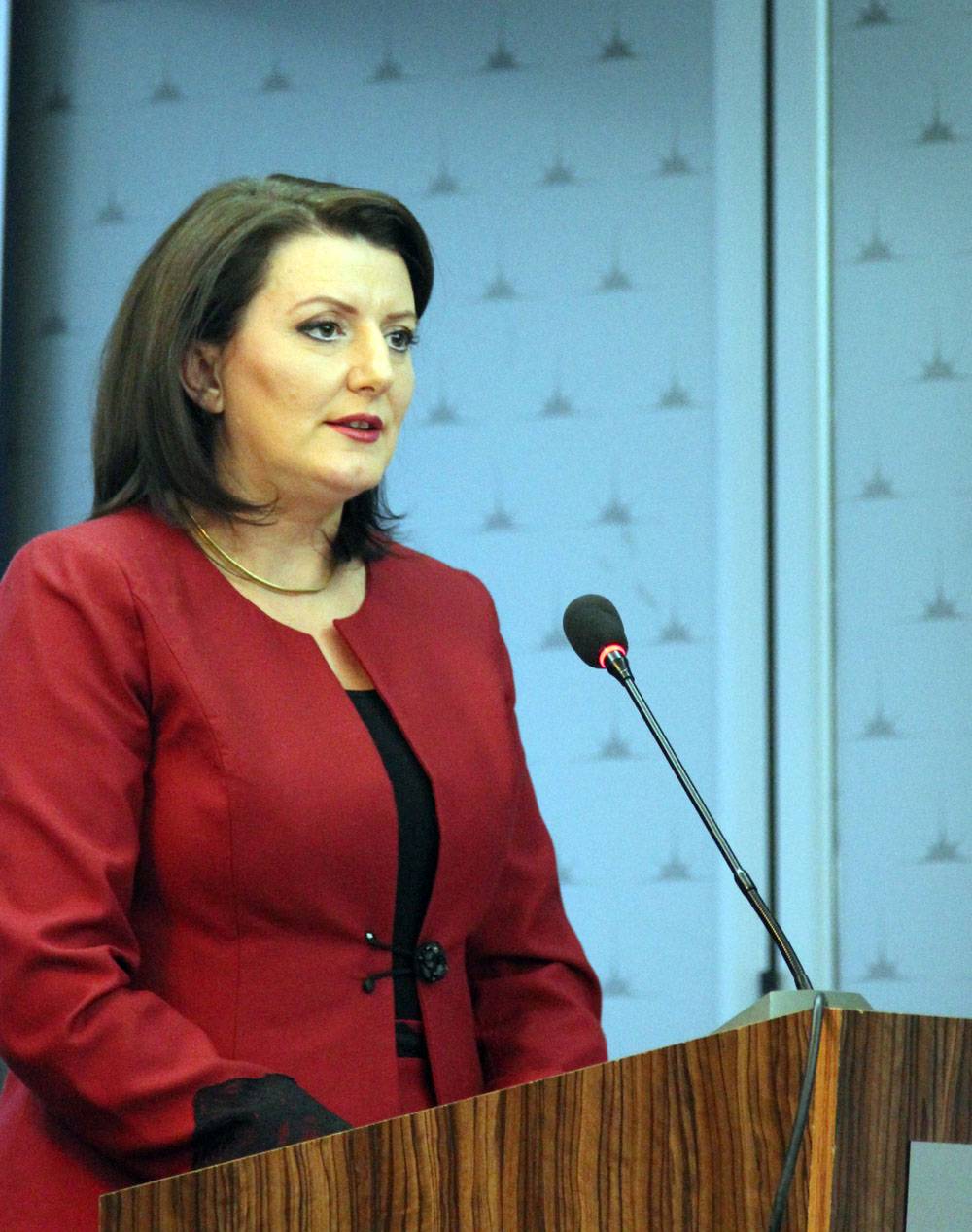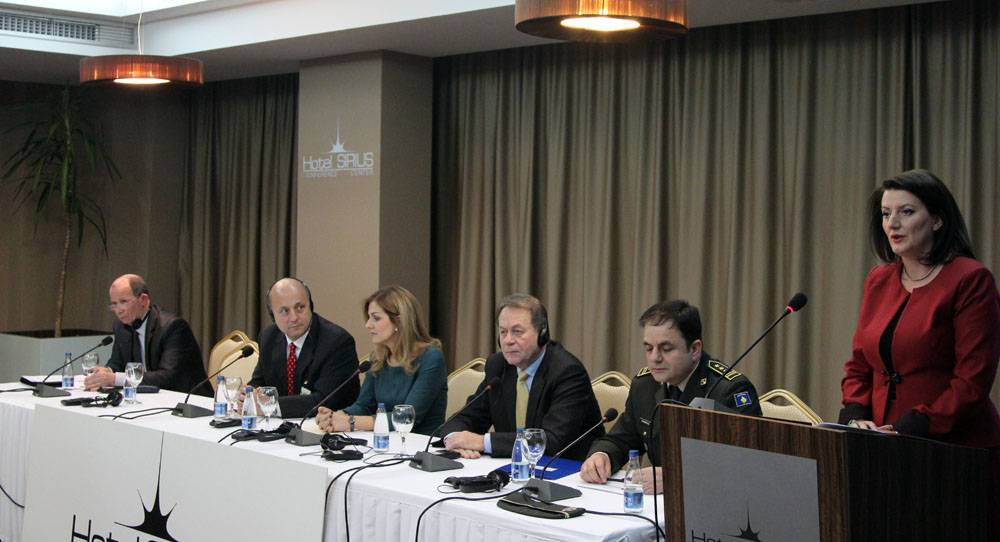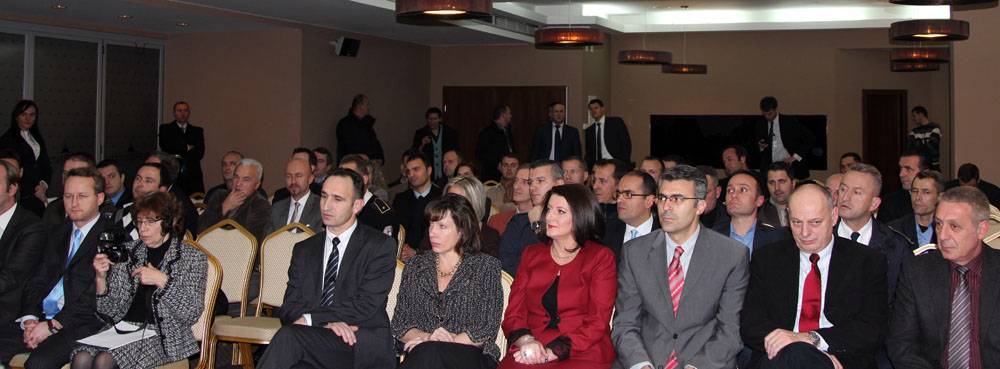I would like to express my gratitude to the George C Marshal Centre for organizing this conference, on such an important subject, not only for Kosovo but for the whole region and beyond – Combating corruption.
Honourable General Wachter,
Honourable Ambassador Jacobson,
Professors Zeneli and Vann,
Honourable Representatives of the Institutions of Kosovo,
Honourable graduates of the Marshall Centre,
I would like to express my gratitude to the George C Marshal Centre for organizing this conference, on such an important subject, not only for Kosovo but for the whole region and beyond – Combating corruption.
Marshall Centre for Security Studies, following the visionary principle of George C Marshall, who considered the security of the country as a precondition to stability, has instigated cooperation, reconciliation and peace between nations.
With their unique experience in education and training, participants of the Marshall Centre, today generate a powerful network of people, with influence in the societies and the states where they come from, including the young leaders from Kosovo and the region. This makes the Marshall Centre an avant-garde institution in the field of security.
We are all dedicated in creating a world that is more just, peaceful and stable and we stand united in our stance towards increasing security and defending freedom.
Just as Aristotle stated over two thousand years ago, “the only stable society is the one in which every human being is equal before the law”.
In order to jointly combat the evils that we face today, in order to defend the rights won by the struggle of our fellow citizens to work and live in peace, we must adhere to this principle, we must put the emphasis on cooperation, promise to undertake joint actions, invest in preventive measures and reconfirm our commitment to exchange accurate information with each other.
We must strengthen our cooperation platform; build a system of education and prevention which will in turn create unfavourable conditions for criminals and the networks that want to exploit and abuse human beings, states and international routes in order to spread their criminal activity.
We must build all the mechanisms necessary in order to prevent our societies from getting involved with criminal networks and that the values of our society are not affected by organized crime.
Thus, as society and leaders, we must at any given moment be more upfront, more dedicated and motivated in our fight against these criminal networks.
Corruption is a negative phenomena that affects every cell in the functioning of the state and as a result it strongly damages the welfare of the citizens, by empowering certain groups of people guided by personal interest.
The effects of corruption go beyond the damage afflicted by the momentary gains earned by these groups. Corruption creates long term negative effects in the economic and social development of the country, and alters the relations between the public administration and the citizen by placing the state in the service of the crime and not the citizen.
Corruption creates a shadow system, where bribery, kickbacks and exchange of favours become abusers of the law by holding hostage the development and progress of the country.
In times of insecurity, conditions are created for criminal gangs to benefit from the absence of order. They tend to organize quickly and benefit from the institutional void. This helps them expand their network of smuggling and theft, to eliminate or blackmail their opponents, to destroy business by establishing racketeering and to create connections which try to influence the determination of future political configuration.
The fight against corruption is the fight for progress, for economic development, for consolidation of democratic institutions, for the functioning of the legal state, for increasing of the domestic and foreign investment and foremost for the integrity of the society.
This fight requires a commitment by the whole society in establishing the principle of zero tolerance. Before the law everyone is equal and no one can be above it.
All countries of the world face corruption, whether they are developed or developing countries. But in the societies in transition and in the post-conflict ones, where the functioning of the legal state is still fragile, the impact and proliferation of this phenomenon is highly threatening.
For this reason, at the phase of consolidating democracy, where we are as a country, strong legal foundations must be established along with institutional mechanisms and civic support so that corruption is not only punished but primarily prevented by not allowing under any circumstances for this phenomenon to be rooted in the operational system of the state and the society.
Kosovo as a new state has projected its future towards the integration into the Euro-Atlantic structures. Our country has made significant progress in establishing relations with the European Union by receiving the visa liberalisation roadmap and the feasibility study for the initiation of the negotiations for the Stabilisation- Association Agreement. The fight against corruption and organized crime will be one of the main dimensions which will measure our pace towards these structures.
Corruption has a negative effect on the image that the country projects on the international stage and undermines the process of recognitions, membership in international mechanisms and in attracting foreign investments.
Hence, a lot must be invested in the adoption of strict legislation and in the institutions charged with the protection of law and order which would be prepared to hit organized crime and corruption. Another essential rule is that there must be proper division between the executive, legislative and judicial powers by emphasizing that no one is untouchable and no one can be above the law.
It is also particularly important to build the three main pillars: the police, the prosecution and the courts, where dedicated, honest, and dignified individuals will be in commend who are paid well and protected by law.
At the beginning of the year, with a special decree, I have established the National Anti-Corruption Council, which gathers around itself all the stakeholders who have executive and monitoring powers in the judicial system and that hold primary responsibility in the fight against corruption.
This coordinative body has stimulated a comprehensive commitment, a more efficient coordination and stronger implementation of the law by identifying problems and identifying solutions. Already, the Judicial Council of Kosovo is treating with a higher priority the cases related to corruption, which has in turn a significant impact on the number of reported cases.
The Council has served as well to raise civic awareness that the fight against corruption it is not only the responsibility of the institutions but also of the civil society and each individual. Corrupt is not only the individual who receives the bribe, but also the one who gives it.
Corruption is also helped by silence and non-reporting.
One of the matters addressed by the Council has been corruption in the field of public procurement, the topic which we are also discussing at this conference.
Deviations in public procurement damage the business climate, fair competition on the free market, investment conditions and confidence in governance.
Therefore it is very important that public procurement procedures, especially when the public sector interacts with the private sectors, to be transparent, to implement the legal framework which encourages competition and the implementation of contracts to be monitored.
I am confident that this conference will serve to identify the shortcomings in the field of public procurement as well as the challenges, by bringing forth the best practices and experiences and concrete recommendations that will help raise institutional responsibility and social awareness in the field of public procurement.
We must not allow that the welfare of the citizens and the future of the country to be ruined by the misconduct and bad management of public procurement.
It was only few days ago the last report of Transparency International was published, which showed an improvement in reduction of the level of corruption in Kosovo compared to the last year’s level. We are pleased by this report as it shows that our efforts as a society have produced positive results, however we are aware that there is still much to be done. The contribution of the Marshall Centre towards these efforts is highly welcomed.
As US President Dwight Eisenhower said on one occasion, “The world no longer has a choice between force and law; if civilization is to survive, it must choose the rule of law”.
Kosovo has chosen the rule of law.
I express my support for the intensification of such initiatives in Kosovo and the rest of the region, and I have had the privilege to be a part of the Marshall Centre programs.
Thank you!
This post is also available in: SQ



